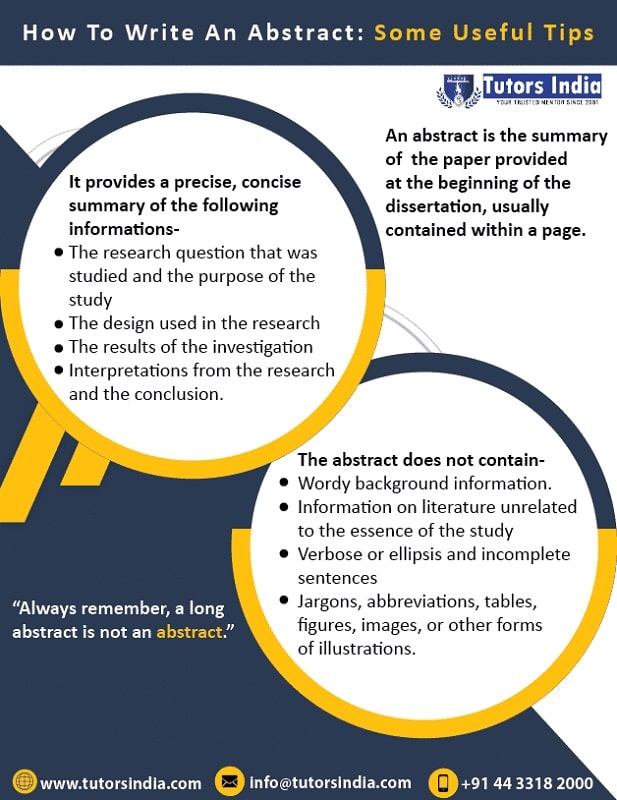How To Write An Abstract: Some Useful Tips?
Abstract:
An abstract is the summary of the paper provided at the beginning of a dissertation. The abstract contains the following:
- The research question that was studied and the purpose of the study,
- The design used in the research,
- The results of the research,
- Interpretations of the research and the conclusion.
These are provided briefly, usually contained within 300 words, and most often in the given sequence.
The abstract is the opening to any thesis or dissertation and as such, must keep the readers interested and provide sufficient information to give a brief but precise idea about the whole research; a reader is likely to choose to continue reading the rest of paper or close the book depending on the abstract.
Although, the abstract is provided at the beginning of the dissertation, writing an abstract is usually done after the completion of the rest of the dissertation; only when it is done, writing a summary is hassle-free.

Some Important Things To Keep In Mind For Writing A Good Abstract:
- The abstract is a summary of the research that is complete. Hence, it is written in past tense.
- An abstract summarizes the dissertation in one brief but a concise paragraph.
- Use active voice when possible or needed. But an abstract will contain sentence constructed in the passive voice.
Since the abstract written after completing the rest of the paper, there is a systematic way one could go about for writing a good abstract. This includes:
- Summarize each part of the dissertation; condense the essence of individual components that form the whole.
- Highlight all the important and key points that will provide an overview of the research.
- This should give an idea of what would form an abstract and the order or sequence in which it will be presented.
Try briefing it further if you feel it is still too long to be put in the abstract section. Then add transition words to provide a narrative flow and concisely present the information.
The abstract opens with a reiteration of the research question and its context to the field of study, although it will be again introduced to the reader in the introduction of the thesis. One must remember an abstract does not contain the thesis statement which will come in the introduction.
It is followed by the summary of methods employed in the research, the results, and conclusion. Each section must be contained in a sentence or two while balancing and including all relevant and key aspect of all the sections.
A simple rule of thumb to writing good abstract is to think of writing a dissertation for a similar study whose only information available will be an abstract and if it will be sufficient to make one understand the whole study.
An abstract conveys the most important information in a dissertation in the fewest words possible.
As much as the above information needs to be included in the abstract, it is important to avoid certain things while writing the abstract.
The abstract should not contain wordy background information.
Information on literature unrelated to the essence of the study must be avoided.
Try not to be verbose or use ellipsis and incomplete sentences (a general mistake many make while writing summaries)
Jargon’s related to the particular field of study should be avoided as much as possible, to not confuse the readers.
Abbreviations must be avoided in the abstract; necessary abbreviations will be included in the dissertation.
The abstract should not include tables, figures, images, or other forms of illustrations.
A long abstract is not an abstract.
Links, References, Related Posts
– Choosing The Right Data Collection Methods For A Successful Thesis
– Why Tutors India for Econometric and Financial Statistical Analysis Support Services
– The Importance Of Having Biostatisticians On Every Clinical Research
– Why Tutors India for Statistical Support Services – Our Statistics Mentors
